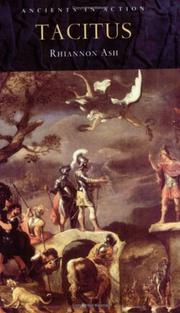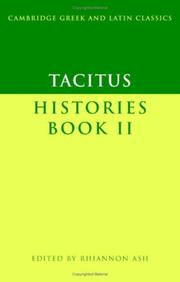| Listing 1 - 9 of 9 |
Sort by
|

ISBN: 1853996874 9781853996870 Year: 2006 Volume: *1 Publisher: London : Bristol Classical Press,
Abstract | Keywords | Export | Availability | Bookmark
 Loading...
Loading...Choose an application
- Reference Manager
- EndNote
- RefWorks (Direct export to RefWorks)
Book
ISBN: 0715628003 9780715628003 Year: 1999 Publisher: London : Duckworth,
Abstract | Keywords | Export | Availability | Bookmark
 Loading...
Loading...Choose an application
- Reference Manager
- EndNote
- RefWorks (Direct export to RefWorks)
Empereurs --- Rome. Armée --- Rome --- 1er siècle --- 68-69 (Guerre civile) --- 69-96 (Flaviens) --- Tacite,

ISBN: 9780521814461 9780521891356 0521891353 0521814464 Year: 2007 Publisher: Cambridge New York : Cambridge University Press,
Abstract | Keywords | Export | Availability | Bookmark
 Loading...
Loading...Choose an application
- Reference Manager
- EndNote
- RefWorks (Direct export to RefWorks)
Rome --- History --- Rim --- Roman Empire --- Roman Republic (510-30 B.C.) --- Romi (Empire) --- Byzantine Empire --- Rome (Italy) --- Tacite, --- Rome - History - Civil War, 68-69
Book
ISBN: 9780521269391 0521269393 9781107009783 1107009782 9781108378130 Year: 2018 Publisher: Cambridge, United Kingdom ; New York, NY ; Port Melbourne, Australia ; New Delhi, India ; Singapore : Cambridge University Press,
Abstract | Keywords | Export | Availability | Bookmark
 Loading...
Loading...Choose an application
- Reference Manager
- EndNote
- RefWorks (Direct export to RefWorks)
Book
ISBN: 9780199285099 Year: 2013 Publisher: London Oxford University Press
Abstract | Keywords | Export | Availability | Bookmark
 Loading...
Loading...Choose an application
- Reference Manager
- EndNote
- RefWorks (Direct export to RefWorks)
Historians --- Historiographers --- Scholars --- Tacitus, Publius Cornelius. --- Tacitus, Publius Cornelius --- Tacitus --- Tacite --- Tacitus, Caius Cornelius --- Tacitus, Cornelius --- Tacito --- Tacito, Caio Cornelio --- Tacitus, C. Cornelius --- Tacitus, Gaius Cornelius --- Tacitus, P. Cornelius --- Tat︠s︡it, Korneliĭ --- Taxituo --- Criticism and interpretation. --- Rome --- Historiography. --- Cornelius Tacitus, Gaius --- Tacite, --- טאקיטוס, קורנליוס --- Τακιτος --- Takitos
Book
ISBN: 9783775753005 Year: 2022 Publisher: Berlin Zürich Frankfurt am Main Hatje Cantz Verlag Kunsthaus Zürich Schirn Kunsthalle
Abstract | Keywords | Export | Availability | Bookmark
 Loading...
Loading...Choose an application
- Reference Manager
- EndNote
- RefWorks (Direct export to RefWorks)
Niki de Saint Phalle (1930-2002) is one of the most important women artists of her generation. Most people know her for her sensual *Nanas*-voluptuous, colorful female figures that can often be found in public spaces. Her multifaceted oeuvre encompasses much more, however, including painting and drawing, as well as assemblages, actions, theater, film, and architecture. At the center of her work is a critical questioning of social and political conventions, institutions, and role models - confrontations that continue to maintain their relevance to this day.
Art --- art [fine art] --- color [perceived attribute] --- human figures [visual works] --- Saint-Phalle, de, Niki --- menselijk lichaam --- Saint Phalle, Niki de --- menselijk lichaam. --- Saint Phalle, Niki de.
Book
ISBN: 9780199662326 0199662320 0191799173 0191639397 Year: 2015 Publisher: Oxford : Oxford University Press,
Abstract | Keywords | Export | Availability | Bookmark
 Loading...
Loading...Choose an application
- Reference Manager
- EndNote
- RefWorks (Direct export to RefWorks)
Over recent decades, the debate about how individuals are portrayed in prose-texts of Greek and Roman historiography and biography has evolved in increasingly nuanced ways. The sorts of questions which now tend to be raised concerning such prose-texts brings them closely into line with the more subtle analysis usually reserved for poetry. Moreover, the engagement with literary strategies at work in historiography and biography has a fundamental impact both on the relationship of these texts with poetry and on the status of these genres as historical evidence. In twenty-four chapters written by leading experts in their fields, 'Fame and infamy' considers the central question of characterization within Greek and Roman historiography and biography from a fresh perspective, combining close readings of texts of individual authors and overarching exploration into questions of how and why characterization in the ancient world evolves in the ways that it does. Spanning a wide period of time, and focusing on writers from both the Greek and Roman worlds - from Herodotus to Cassius Dio, and from Cicero to Suetonius and beyond - this volume is essential reading for anyone interested in the evolution of the genres of historiography and biography in the ancient world.
Festschrift - Libri Amicorum --- Biography --- Historiography --- Geschiedschrijving. --- Biografieën. --- History --- Biography. --- Historiography. --- Pelling, C. B. R. --- To 1500 --- Greece. --- Rome (Empire) --- Greece --- Historiographie --- Pelling, Christopher Brendan Reginald
Book

ISSN: 18684785 ISBN: 3110303698 9783110303698 1299721745 9781299721746 9783110303681 311030368X Year: 2013 Volume: v. 20 Publisher: Berlin Boston
Abstract | Keywords | Export | Availability | Bookmark
 Loading...
Loading...Choose an application
- Reference Manager
- EndNote
- RefWorks (Direct export to RefWorks)
Neither older empiricist positions that genre is an abstract concept, useless for the study of individual works of literature, nor the recent (post) modern reluctance to subject literary production to any kind of classification seem to have stilled the discussion on the various aspects of genre in classical literature. Having moved from more or less essentialist and/or prescriptive positions towards a more dynamic conception of the generic model, research on genre is currently considering "pushing beyond the boundaries", "impurity", "instability", "enrichment" and "genre-bending". The aim of this volume is to raise questions of such generic mobility in Latin literature. The papers explore ways in which works assigned to a particular generic area play host to formal and substantive elements associated with different or even opposing genres; assess literary works which seem to challenge perceived generic norms; highlight, along the literary-historical, the ideological and political backgrounds to "dislocations" of the generic map.
Latin literature --- Literary form. --- Form, Literary --- Forms, Literary --- Forms of literature --- Genre (Literature) --- Genre, Literary --- Genres, Literary --- Genres of literature --- Literary forms --- Literary genetics --- Literary genres --- Literary types (Genres) --- Literature --- History and criticism. --- Genre. --- Latin. --- Literature. --- Poetics. --- Theory.
Book

ISBN: 3110474174 3110475871 9783110475876 9783110475883 311047588X 9783110474176 9783110472523 311047252X Year: 2016 Publisher: Berlin Boston
Abstract | Keywords | Export | Availability | Bookmark
 Loading...
Loading...Choose an application
- Reference Manager
- EndNote
- RefWorks (Direct export to RefWorks)
The political allegiances of major Roman poets have been notoriously difficult to pin down, in part because they often shift the onus of political interpretation from themselves to their readers. By the same token, it is often difficult to assess their authorial powerplays in the etymologies, puns, anagrams, telestichs, and acronyms that feature prominently in their poetry. It is the premise of this volume that the contexts of composition, performance, and reception play a critical role in constructing poetic voices as either politically favorable or dissenting, and however much the individual scholars in this volume disagree among themselves, their readings try to do justice collectively to poetry’s power to shape political realities. The book is aimed not only at scholars of Roman poetry, politics, and philosophy, but also at those working in later literary and political traditions influenced by Rome's greatest poets.
| Listing 1 - 9 of 9 |
Sort by
|

 Search
Search Feedback
Feedback About UniCat
About UniCat  Help
Help News
News